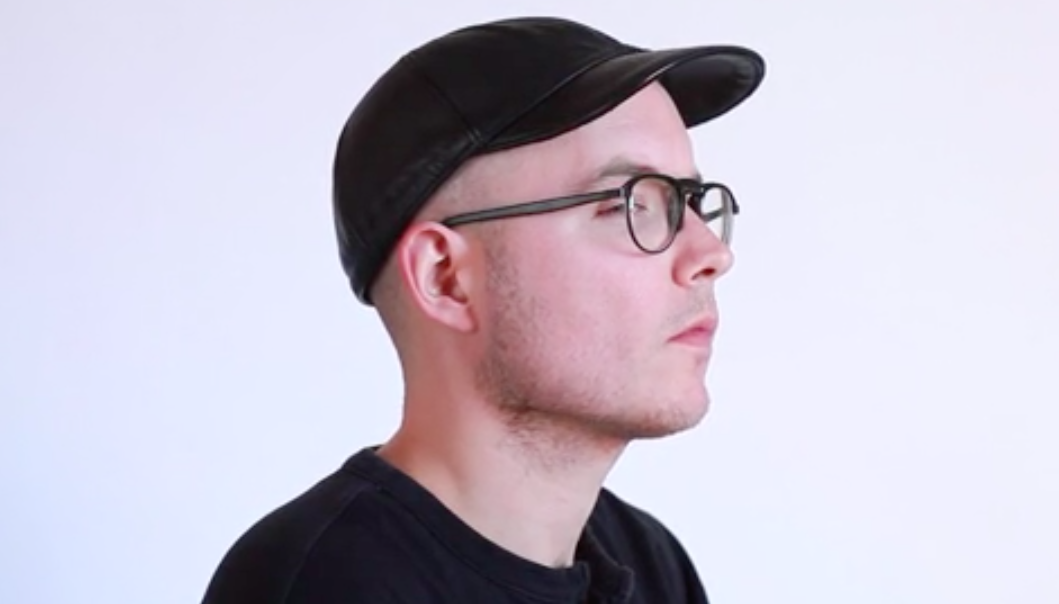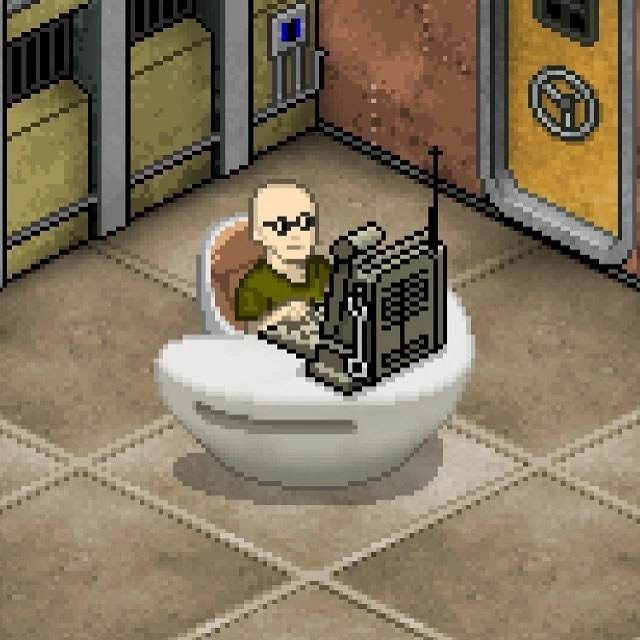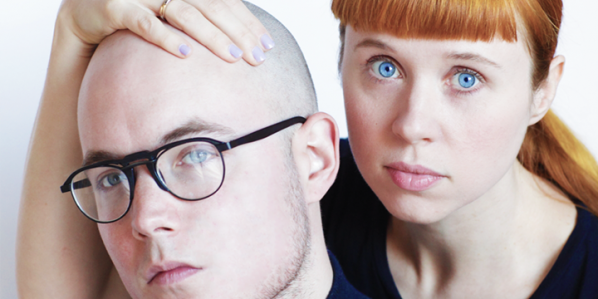Mat Dryhurst is both radically interested in things, and just radically interesting in general. He’s a digital artist and musician who’s opened for Radiohead alongside his partner, avant-garde musician Holly Herndon, taught classes on the global music business at the Berlin outpost of NYU’s Tisch School of the Arts, and is constantly thinking up new ways that artists can assert ownership over their work in the internet age.
“I think the challenge for our generation is that material space is no longer there,” Mat Dryhurst says, shortly after we begin speaking. “Cities are becoming increasingly expensive and prohibitive to pursuing a path that doesn’t involve a 60-hour work week. It’s become harder for people who want to be a part of a cultural conversation [to be part of the public space].”
 Dryhurst’s many attempts to even the artistic playing-field include Saga, a hosting service for creators to overlay texts on images depending on where they end up online, and a proposal to turn SoundCloud into a community-owned tokenized blockchain economy. Currently, he’s working with Resonate, a streaming co-op using blockchain to cut out record labels and pay musicians a fair per-stream rate. Dryhurst has found himself in the unlikely position of serving a bridge between the music community and the cryptoverse, advocating for musicians at blockchain conferences, while simultaneously trying to sell the music industry on blockchain in the pages of publications like The Wire and FACT.
Dryhurst’s many attempts to even the artistic playing-field include Saga, a hosting service for creators to overlay texts on images depending on where they end up online, and a proposal to turn SoundCloud into a community-owned tokenized blockchain economy. Currently, he’s working with Resonate, a streaming co-op using blockchain to cut out record labels and pay musicians a fair per-stream rate. Dryhurst has found himself in the unlikely position of serving a bridge between the music community and the cryptoverse, advocating for musicians at blockchain conferences, while simultaneously trying to sell the music industry on blockchain in the pages of publications like The Wire and FACT.
Skyping from his home in Berlin, a city that for years has been the epicenter of the digital art, Dryhurst says he sometimes finds it hard to reconcile his interest in technology with his (very) left-leaning political ideals. The Left’s distrust of monopolistic tech companies has a habit of metastasizing into a reflexive skepticism of technology itself, he says. But if we’re going to find alternatives to Facebook, Google, and Amazon, it’s going to come from the next generation of tech, and someone using that tech for good before someone gets rich by using it for evil. The blockchain opens up new ways to distribute creative media, data, and the intellectual property attached to it.
“The big part that the Left misses about crypto is the group equity component to some token ecosystems. The possibility of marrying the distribution of tokenized assets with the ownership of physical assets is hugely interesting for the future of artistic communities,” Dryhurst says.
In conversation, Dryhurst is eclectic and engaged, offering enthusiastic endorsements of everything from the Bay Area rapper E-40, to the futurist Ted Nelson, to the potential of machine learning as an artistic tool. Over an hour, Dryhurst and I discussed his tendency to “get it in the neck from both sides,” his worry that many blockchain projects are conservative in their thinking, and why sometimes, socialists and libertarians should be friends.
Image courtesy of Mat Dryhurst

How did you become interested in the crypto space?
I fell into being interested in this area out of a feeling like the arts has kind of exhausted its plays. There’s very kind of circular conversation that happens. I’ll be like, “It’d be cool to work on some projects involving new [technological] infrastructure” or whatever. Then there is this weird feeling where the places where you have to go often to be with a working artist like New York, London, and increasingly Berlin, are kinda locked down institutionally, you know?
Totally.
There are these rules. Still, there’s this is fantasy of being able to make your own space. I think the challenge for a lot of our generation is that that material space is no longer there. Cities are becoming increasingly expensive and prohibitive to pursuing a path that doesn’t involve a 60-hour a week. It’s become harder and harder for people who want to be a part of a cultural conversation.
And simultaneously, you’ve seen this like professionalization of the arts, right? But, on top of that, the internet is the closest thing we have to a near-infinite virtual space to try and manifest something. The problem is that the virtual space is kind of fallacious. You can have near infinite virtual space to see the community or spark an idea, but unless there’s material weight underpinning that, you don’t have much agency in the world.
What are you working on now?
The thing I’m working on currently isn’t really ready to go, but Holly and I have been doing a bunch of work on machine learning, which has been super rewarding, and we’ve figured out something cool and noble in that domain as far as music goes. Holly and I have always been very critical of technical infrastructure. It’s weird that musical conversation hasn’t changed that much in the last 20 years given how much everything else has. The musical form is fairly stagnant, conceptually. With Holly, the goal is always to develop our own software. We try and see it as like a practice of possibility. We’re actually coming forward with proposals, in some cases, that are are executable—you can actually run like software, or you can participate in real space.
The next thing, which is the most relevant to crypto, is looking at the group equity component to some token ecosystems. That is really, really interesting to me. The possibility of being able to marry the distribution of tokenized assets with the ownership of physical assets is hugely interesting to me for the future of artistic communities. And I think it’s something the Left misses about crypto. It ought to be interesting to people on the Left.
"You can’t extricate blockchain or bitcoin from its libertarian origins."
What are some of the challenges with being a person on the Left who also maintains an interest in the crypto space, which tends to be very libertarian-leaning?
Yeah, it’s really challenging. Because you can’t extricate blockchain or bitcoin from its libertarian origins. If you weren’t already super invested in it, I’d completely understand the skepticism. The difference for me in a way is that my approach toward this stuff is always to say, “OK, these [crypto early adopters] are really smart and also now have a significant amount of capital.” It’s very much in my interest to understand what the fuck they’re doing. I’m parasitically looking at crypto real estate asset platforms that are petitioning Luxembourg right now to basically be able to gentrify neighborhoods using tokenized secondary markets. It’s a duty to know that that is one potential future—if you really care about gentrification that’s something you want to be looking at.
That’s like the same reason I follow the stock market.
I started working on this Saga project around 2014. I had no idea about smart contracts or any of that stuff. I’d come to some more primitive conclusions about what a smart contract might be and automating ideological systems as a decentralized framework. And after that, I had a bunch of people who were already deep in crypto come at me and be like, “Are you into Ethereum?” There was a whole community of people thinking along similar lines, but with different outcomes in mind. My initial coming into the space was pretty much like, “I’m looking down the road and I don’t like what I see with these centralized platform monopolies.”
Saga, which allows a person to host their work online and, depending on who posts that work, change it to show they’re happy or unhappy about the way in which it’s being used, is a really interesting way of pushing back against that.
I’m a student of the Ted Nelson school of the world. I love his idea of the one world library. I love the ideas of the early web that never quite came to fruition, but were always quite romantic. I saw an opportunity to create an art project or a publishing framework as a way to test some assumptions about self-ownership and self-governance. So, wanting to do that in opposition to the centralized tech giants, it became natural for me to then get interested in crypto. You had this unusual alliance happening between a very, very small minority of people on the Left who were concerned about platform capitalism, and these more libertarian developers who were similarly concerned about platform capitalism. Privacy, for example, is one key kind of pain point for both communities.

Completely.
On this crypto front, I have really good friends of mine of all different stripes on the Left who serve my ass to me for a million and one reasons about why it’s problematic for me to invest time in this stuff. But the good thing I’ve consistently seen is that those same people end up getting more interested in crypto. I hope that me making an ass of myself maybe eroded their resistance to it a little bit. It’s a weird position and I think that fundamentally I try to be earnest with this stuff. I’m interested in both.
You’ve said that for a place like Wired to write about something new or strange, it almost has to have the word “blockchain” in it to be taken seriously. What do you mean by that?
I think that in many ways “blockchain” is just a proxy for “there’s a group of smart people who are saying there’s perhaps a different or alternate way to coordinate activities in a certain area.” For me, the crypto space generally has been this breath of fresh air. Irrespective of what stack you decide to use toward a problem—or whether a stack is even necessary for that problem—there are a bunch of people who are clearly self-identifying as interested in challenging the inexorable rise of these platform monopolies and their pernicious, ugly erosion of cultural structures in the name of algorithmic populism.
"Privacy is one key kind of pain point for both communities."
Are you a blockchain maximalist?
I’m not a loyalist or a zealot. I just don’t want to dismiss something that could be quite potentially transformative. It’s been really encouraging to see people come into [Berlin]. There’s some kind of a small but disproportionately influential subculture happening around this space. I’m just as interested in other decentralized systems that have nothing to do with the blockchain that actually hate those things. People congregating and making interesting art or communities, that’s always been my interest.
How can blockchain help artists assert ownership in a digital space?
The first thing I’ll say is negative. There are many projects—many of which are funded ridiculously well—who mistakenly think if you stick a blockchain or a token on it, then all of a sudden you’ve come up with something revolutionary. The first block in the bitcoin blockchain is a middle finger to the banks, right? So, the first gesture in whatever your music blockchain project, in my mind, should be a middle finger to the logic that the music industry should monopolizes the way music works.
"There's a small but disproportionately influential subculture happening around this space."
What you’re talking about is a more fundamental revolution, not just the musical equivalent of Walmart announcing that they’re putting all their lettuce farmers on a blockchain, with Walmart continuing to be in charge?
I think that there are many visionaries in the blockchain space whose domain expertise is cryptography or coordination or consensus, or even distributed systems. And I defer to them. But asking technology visionaries to also be visionaries about culture, where [their ideas] are less mature [doesn’t make sense]. We now have a bunch of people now who have made tens of millions—in many cases just from releasing poorly edited essays—who now have a supreme confidence, an invulnerability complex, and feel like they can go and solve any problem in the world. There’s a constant tension between being excited by new ideas, and saying “actually, you don’t know what the fuck you’re talking about.”
The big thing for me is group equity. You start from the thought experiment of group equity and extrapolate out. Someone in crypto said to me, “we have an opportunity to reassess value.” In the arts and in music, that means grabbing the opportunity to reassess cultural value—both the value of artifacts themselves, and the greater value of these things for society.
This interview has been edited and condensed. Pictures: Mat Dryhurst.